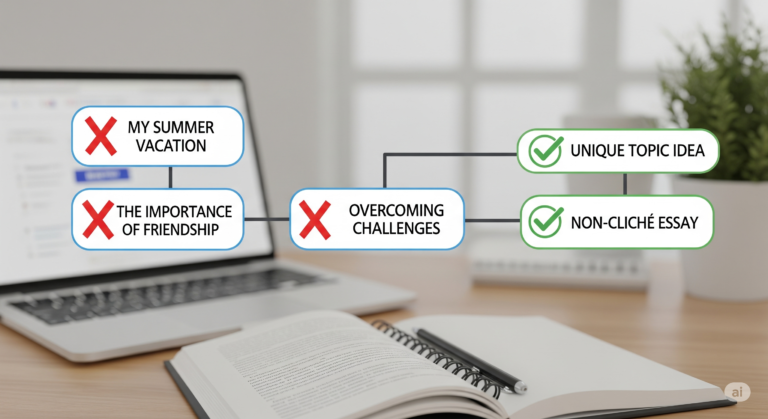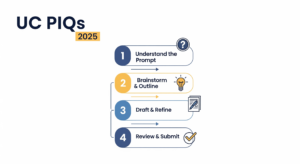Why “unique” ≠ dramatic
Admissions readers aren’t hunting for the wildest story; they’re looking for clear thinking, specific detail, and reflection. Small, honest moments beat big, generic narratives every time.
The 10-Minute Decision Tree
Set a timer for 10 minutes. Follow the branches quickly—no overthinking.
1) Dump moments (2 minutes).
List 5–7 tiny, real moments from the past year. Think scenes, not themes.
- Examples: rewiring a lamp with your aunt; teaching your brother to parallel park; missing a note in a jazz solo; the 5:30 a.m. bread shift; translating a doctor visit for a neighbor.
2) Pick one with change (1 minute).
Circle the moment where you changed your mind, learned a limit, or improved a system.
- No obvious change? Choose the one with the clearest before/after.
3) Cliché check (1 minute).
If your moment is “mission trip,” “sports injury comeback,” “winning the championship,” “founding a startup,” or “tragic loss” → zoom in to a micro-moment inside it (one conversation, one decision, one mistake).
- If you can’t find a micro-moment, pick your next-best moment.
4) Specificity ladder (2 minutes).
For your chosen moment, jot these:
- Objects: What 3 physical things were there? (blue ceramic mug, frayed lanyard, WD-40 can)
- Place & time: Where exactly, and when? (Tuesday 6:15 a.m., bakery loading dock)
- People & stakes: Who else was there? What could go wrong/right?
- Action verbs: What did you do? (relabel, recalibrate, translate, double-proof, re-tune)
If your answers feel vague, the topic will read vague. Tweak the moment or pick another.
5) Insight test (2 minutes).
Free-write 3–4 sentences: What did this moment teach you that you still use? Keep it practical (a habit, a principle, a question you now ask).
6) Recognizability test (2 minutes).
Would a close friend read this and say, “Yep, that’s you”?
- If no → add 2 quirks/details only you would include (your wording, your workaround, your “tell”).
- If yes → you have a viable topic.
You’re done. You don’t need a life-movie plot. You need a crisp moment + specific detail + one durable takeaway.
Cliché Alarms (and Easy Fixes)
- Sports injury “comeback” → Focus on a non-heroic skill learned (patience, rehab logs, coaching younger players).
- Mission/service trip → One relationship or system fix you actually maintained after returning home.
- Generic “love of STEM/humanities” → One problem you solved and the constraint that forced creativity.
- “Grandparent taught me perseverance” → A single routine you adopted (tea at 9 p.m., daily walk) and how it changed your behavior.
- “Starting a business” → The ugly backstage (refund policy mistake, inventory miscount, first angry email) and how you iterated.
Boring → Brilliant: 5 Mini-Transforms
- Sports
- Generic: “Tearing my ACL taught me resilience.”
- Specific: “At 4:55 a.m., I logged my 100th PT set—then rewrote my soccer notebook into a rehab tracker. The habit stuck: measure first, brag never.”
- STEM
- Generic: “I love coding because it’s logical.”
- Specific: “Seventeen lines hid the bug in an Arduino chicken-coop door. I finally read the datasheet… and learned humility tastes like WD-40.”
- Family/Translation
- Generic: “Moving a lot made me adaptable.”
- Specific: “I pack the blue mug last. New kitchens feel less foreign when the mug is on the left shelf. It’s my 5-minute routine for making anywhere usable.”
- Job/Operations
- Generic: “Working at a bakery taught me responsibility.”
- Specific: “We kept remaking mis-labeled loaves. I tested a colored-sticker system during my 5:30 shift—mislabels dropped from 8 to 1 in a week.”
- Music/Creativity
- Generic: “Jazz taught me improvisation.”
- Specific: “After bombing a solo in D minor, I built a ‘mistake map’—circling the exact bars I avoid. I started collecting mistakes on purpose.”
Quick Tests Before You Commit
- 1) Replace-the-nouns test: Swap your nouns with someone else’s. If the essay still “works,” it’s generic.
- 2) Would-a-friend-recognize-you test: If not, add your diction, your process, your tools.
- 3) Time-stamp test: Can you place the scene on a calendar? If not, zoom in further.
Outline Your Essay in 15 Minutes
Use this 5-beat arc (130 words per beat ≈ 650 words):
- 1) Context (where/when): Drop us into the scene with 1–2 concrete details.
- 2) Spark (tension): What went wrong, or what question wouldn’t leave you alone?
- 3) Struggle (actions taken): Show attempts, experiments, revisions—verbs only you would use.
- 4) Shift (insight): The small change in thinking/behavior you kept.
- 5) So what (carry-forward): Where this shows up now (class, club, work, family). Avoid future-casting big promises.
6) Micro-checklist: No résumé paragraphs. No sweeping morals. At least 3 sensory details, 2 numbers, 1 specific name (tool, street, piece, dataset).
FAQ
1) Can I write about sports or an injury?
2) What if my life feels ordinary?
3) Is it okay to be funny?
Next Steps (and a tiny challenge)
- Pick one moment today and run it through the Specificity Ladder.
- Draft beats 1–3 only (Context → Spark → Struggle). Stop at 390–420 words.
- Tomorrow, write beats 4–5 in one sitting. Trim to 650.









